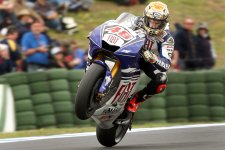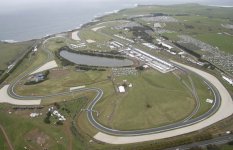Bridgestone MotoGP Preview - Round 15:
Australia, Phillip Island
Tuesday 13 October 2009
Bridgestone slick compounds available:
Front: Soft, Medium.
Rear: Hard, Extra Hard (asymmetric)
Round 15 of the 17-race calendar is the first in an overseas back-to-back pairing of races, and will also mark the 50th premier class win on Bridgestone tyres. Situated on the southern coast of Australia, Phillip Island is widely recognised as the most spectacular but the most demanding circuit visited by the MotoGP paddock, and it is for this reason that Bridgestone will bring all-new specification rear tyres.
Phillip Island is the fastest circuit on the calendar with an average speed recorded last season by race-winner Casey Stoner of 175.990km/h. The layout of the track is fast and flowing, with the Honda Hairpin representing the only real heavy braking point in the lap.
The shoulder grip and durability of the rear Bridgestone tyres in particular will be really tested, and in anticipation of this Bridgestone have selected two new and specifically developed specifications of rear tyre to the venue. The two available rear specifications have new constructions developed to offer improved durability at a higher operating temperature. The two new rear specifications are variants of the hard and extra hard compound slicks used in Germany, but utilise a new construction to further increase their heat durability. They will only be used at Phillip Island, and have been developed specifically for the unique demands of this grand prix.
This year is the 15th edition of the race at Phillip Island and in recent years Bridgestone has a strong track record at the circuit. Casey Stoner won in 2007, the first win for a Bridgestone-shod rider at Phillip Island, and his Ducati Team teammate Loris Capirossi was second. Last year, Stoner triumphed again ahead of Valentino Rossi, who had sealed his first premier class World Championship on Bridgestone tyres at the previous race in Japan.
Hiroshi Yamada – Manager, Bridgestone Motorsport Department
“We will celebrate the 50th win on Bridgestone tyres in Australia, so the grand prix will mark an important occasion in Bridgestone Corporation’s motorsport heritage. We are honoured to be the Official Tyre Supplier to the MotoGP series, but we are also very proud that we have achieved this since only entering the sport in 2002. Indeed since Tamada achieved the first win on our tyres in 2004 we have come a long way in a short space of time. We are nearing the end of the season yet the fight is still on for the World Championship title, so I am looking forward to an exciting race to mark this milestone for us.”
Tohru Ubukata – Manager, Bridgestone Motorcycle Tyre Development Department
“The main technical change for the Australian Grand Prix is the two new specifications of rear tyre we have developed. It is important to note that they are not new compounds but our existing hard and extra hard asymmetric compounds with a developed construction specifically to improve the heat durability of each tyre.
“These two new specifications were evaluated in the two-day post-event test after the Catalunya Grand Prix, but it was after the German Grand Prix at the Sachsenring circuit that the decision was made to use them in Australia. In Germany, some riders experienced the onset of blisters on their rear tyres after the race, although performance and consistency were still good and a new lap record was set, but Phillip Island is even more severe in terms of tyre temperature.
“We have used our previous race-winning experience of Phillip Island and carefully analysed the performance of our tyres in Sachsenring and decided to utilise these new specifications. When we tested them in Catalunya with all teams the results were good, so we had already made the decision to investigate the use of special specifications in Australia. In fact, we decided this before the start of the season as we know how demanding Phillip Island is on tyres, especially rear tyres. By contrast, we have chosen the soft and medium compound front tyres as front tyre temperatures are lower and the soft and medium compounds provide better front-end stability on corner entry which is crucial with the high corner speeds.”










 Eller läser jag fel.
Eller läser jag fel.







